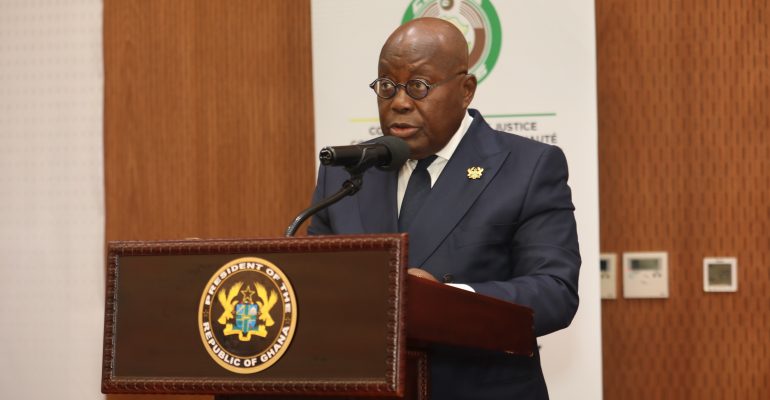CHAIRMAN OF AUTHORITY OF ECOWAS URGES MEMBER STATES TO ENFORCE DECISIONS OF REGIONAL COURT
The Chairman of the Authority of Heads of State and Government of ECOWAS, President Nana Addo Dankwa Akufo-Addo has urged Member States to take measures to enforce the decisions of the Abuja based Community Court of Justice for a stronger integration of the region.
The President said at the opening of the 11th external court session of the Court in Accra on Monday, 21st March 2020 that the Court’s best efforts at delivering on its mandate were being constrained by the poor rate of enforcement which stands at 30 per cent.
“Unless Member States comply with the judgments of the of the ECOWAS Community Court of Justice, it will be difficult to build public confidence the court (and) I appeal to all Member States to ensure that they comply with their Treaty obligations by serving and obeying the judgments of the Court, “ the President said at the ceremony.
In this regard, he urged the nine Member States that have not done so to appoint their competent national authorities for the enforcement of the judgements of the Court to do so without further delay in line with Article 24 (4) of the 2005 Supplementary Protocol on the Court.
Resolving the vexed issue of the enforcement of the decisions of the Court requires Member States to ‘determine the competent national authority for the purpose of receipt and processing of execution and notify the Court accordingly.”
The President also spoke to the requirement that applicants can approach the court without exhausting local remedies contrary to the practice among international courts urging the Court to align its practice and procedures with the generally recognized rules of international courts in other to obviate any potential conflict with national courts and governments.
By aligning with the practice and procedure of other international courts in this regard, the President said the Court will contributing to the systematic development of its authority, adding that as the guarantor of Community norms, the Court has a strategic role to play in its integration.
The chairman also said it was time to revisit the 2018 reduction in the number of judges of the Court from the seven provided in the initial Protocol on the Court to five in 2018 as part of the restructuring of the Community and its institutions, noting that by strengthening the Court, the Community will be providing the enabling legal environment for the integration of the region.
“ We must refocus the judicial mandate of the Court to hasten the integration process (and) it is time for a Community legal order and the harmonization of the legal and judicial systems of Member States.
“National sovereignty should not be an impediment to the realization of our Community objectives… all that is needed is the necessary political will, he added.
In his speech, the President of the Court, Honorable Justice Edward Amoako Asante commended the Republic of Ghana for hosting the session, noting that the presence of the Chairman as well as ‘key political and judicial actors is a clear demonstration of the country’s respect for the rule of law as well as the respect and consideration you have for the Community.”
He said that the two week session is one of the key activities of the Court in line with Article 26 (1) of the Protocol on the Court which allows it to sit in the territory of another Member State where the circumstances or facts of the case so demand.
Moreover, he said that such sessions enable the ECOWAS citizens to observe the court in session, bring justice to the grassroots particularly for indigent applicants who could otherwise not afford the cost of approaching the court as well as enable the court to create awareness of its mandate, jurisdiction, practice and procedure in order to enable citizens take ownership of the Court.
The President said the sessions, which had been held since 2007 in Niamey, Bamako, Porto Novo, Ibadan (Nigeria), Lome, Guinea Bissau and Abidjan, also enables the Court to deepen relations with the national courts of Member States.
He emphasized that the regional court is not an appellate court over national courts although they exercise concurrent jurisdiction in respect of human rights, adding however that the ECOWAS Court only entertain complaints of human rights violations that pertain to the international and Community obligations which Member States are signatory.
“Therefore, we are only concerned with Applications against Member States in respect of their Treaty obligations to respect, protect and fulfil human rights obligations within their territories,” he added.
He express the ‘deep concern’ of the Court about the challenge of the poor enforcement of its decisions by national courts arising mainly from the lack of domestication of the 1993 Revised Treaty and Protocols on the Court by some Member States.
Justice Asante also listed other militating circumstance to include the lack of implementing legislation in Member States that will empower national courts to recognize and enforce the judgments of the court, resulting in the States enforcing the decisions at their convenience.
He also complained about the absence of referrals from national courts on issues related to integration and on which the regional Court has exclusive jurisdiction.
Sixty cases are listed for the session with 26 of them scheduled for judgment.

